
Para lo cual se propone como marco teórico explicativo, una adaptación a las particularidades del caso colombiano, del realismo neoclásico, especialmente el denominado tipo III. Por lo tanto, el objetivo central de la investigación es el explicar el rol de variables domesticas intervinientes en la formulación y ejecución de la política exterior colombiana en el periodo 2010-2018. Por otra parte, la necesidad de comprender y explicar la política exterior, en un periodo, que, según varios académicos especializados, se caracterizó por ser dinámica, compleja, con diferentes objetivos y que, en algunos aspectos, rompió con el curso tradicional de esta política. La primera de ellas, es la de incorporar, al análisis de la política exterior colombiana, propuestas teóricas y conceptuales, que permitan una compresión amplia de su complejo proceso, conciliando, la tradicional división entre factores internos y externos. La presente tesis doctoral, se concibe, fundamentalmente, desde dos necesidades. Iceland therefore reached a highly favorable agreement in all Cod Wars. The outcomes of the disputes reflect how British statesmen were able to make greater concessions due to weaker domestic constraints than those faced by Icelandic leaders. As the disputes escalated and Iceland's Western alignment was put at greater risk, statesmen in both countries, mindful of the dangers of realignment, were able to resolve the conflicts in the end. I argue that the disputes occurred due to (i) powerful domestic pressures on statesmen to escalate and (ii) elite miscalculation.

This study proposes a Neoclassical Realist account for the occurrence and outcomes of the Cod Wars. Historians and political scientists have consequently found it problematic to account for these puzzling disputes. Third, Iceland, a microstate, won each of these disputes. Second, Iceland came close to withdrawing its NATO membership and closing the US base on Icelandic soil, which would have adversely affected the balance of power in the North Atlantic and jeopardized Iceland's core security interests. First, they occurred between two democratic NATO allies, members of a Western security community. In addition, there is a large number of guest workers-people who come to Crimea for major construction projects that are being carried out in the military sphere.Three things are puzzling about the Cod Wars, three militarized interstate disputes spread over 20 years. “An enormous number of bureaucrats are moving in with their families, and those family members are looking for work. “We can say with certainty that we are talking about hundreds of thousands of people,” Ukrainian official Borys Babin, told the news service, including many from Siberia.
#Battle fleet neoclassical free#
Some argue that Putin’s annexation of Crimea is an attempt to return Russia to the glory of its pre-Soviet days, “ as one of the world’s greatest civilizations.” Although Ukrainian nationalism remains strong, particularly in the eastern part of the country, Ukrainian officials and analysts report to Radio Free Europe/Radio Liberty that significant demographic transformation is underway, with a huge influx of ethnic Russians. Russian paramilitaries stand guard outside of a Ukrainian military base in the town of Perevevalne near the Crimean city of Simferopol on March 6, 2014, as part of the standoff between the Russian military and Ukrainian forces in Ukraine’s Crimean peninsula.

After Stalin’s death, Soviet premier Nikita Khrushchev transferred Crimea to Ukraine in a move hailed as a “noble act on behalf of the Russian people.” The transfer was praised at the 1954 meeting of the Presidium of the USSR Soviet Supreme, the Soviet Union’s highest legislative body.

In 1944, Stalin deported about 200,000 Tatars to Siberia and Central Asia, calling the ethnic Muslims traitors to the USSR and bringing in ethnic Russians to replenish the workforce. Russian President Vladimir Putin’s justified the aggression, in part, by asserting that Crimea is mostly comprised of ethnic Russians.įor hundreds of years, Crimea has been the home of Tatars, a group of Turkic speakers who lived under the Ottoman Empire until Catherine the Great annexed the region. But in 2014, Russia seized Crimea from Ukraine in an illegal move that violated the territorial integrity of the former Soviet republic, and sparked a war that has displaced nearly 2 million people and destroyed the country’s infrastructure.


 0 kommentar(er)
0 kommentar(er)
